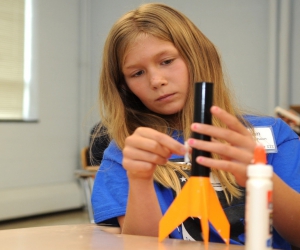
New Online STEAM Education Certificate Added
The certificate prepares students for high-impact careers as teachers across previously siloed disciplines.
Current and emerging education professionals can now re-imagine teaching through a new online program at the University of Pittsburgh’s School of Education.
The Pitt School of Education launched its Certificate Program in STEAM Education in fall 2019.
Forging new paths in 21st century pedagogy, the STEAM education discipline integrates STEM teaching practices (Science, Technology, Engineering, and Math) with the arts. The approach recognizes that incorporating artistic expression into STEM-based studies leads to deeper learning. The “A” in STEAM is a broad definition of the arts, representing liberal arts, language arts, social studies, physical arts, and fine arts and music.
STEAM education pedagogy emphasizes problem-based instruction, enabling students to see the value and relevance of course content. Research studies have shown how important context is to student learning ambitions. For example, a 2008 study from the National Academy of Engineering asked students if they wanted to be engineers. Teen girls were twice as likely as to say no in comparison to their male counterparts; however, when asked if they would like to design a safe water system, save the rainforest, or use DNA to solve crimes, they were just as likely as male students to say yes.
“STEAM Education is an innovative educational model that builds on decades of educational research and practices such a discipline integration, problem-based approaches, and technology-rich environments. However, it also incorporates a connected learning approach that engages youth in issues that are relevant to their lives producing a curricular approach that is focused on the ways youth learn outside of schools. ” said Cassie Quigley, an associate professor of science education and STEAM Program Director.
The Pitt Education STEAM certificate is comprised of four courses for 12 academic credits. Designed to accommodate any schedule, the certificate is 100 percent online and is self-paced. Students can start at any time and set their own schedule through asynchronous learning content.
Students curious about the program can begin with the introductory STEAM Education Continuing Education course. It is offered as a standalone, completely online and self-paced course at a discounted rate, and students who choose afterward to proceed into the certificate program can roll three credits from the course toward the 12-credit certificate. In addition, the course qualifies for Act 48 credits and takes about 20-30 seat hours to complete.
“We’ve worked hard to create a program that schools and teachers want but also ensuring that it serves as a productive opportunity to receive Act 48 credits and PDE’s STEM Endorsement. In this way, the program is stackable, beginning with a continuing education course that can be rolled into the certificate,” said Quigley.
As part of the Pitt Education STEAM Education certificate, students will explore integrated instructional design, transdisciplinary learning approaches, assessment methodologies, and implementation strategies. The courses are designed to enable students to further develop their instructional skillset through meaningful engagement with classroom content.
“’I’ve been hearing about STEAM for a long time, and as a science teacher I was curious about it but didn’t have time to attend a face-to-face course. The certificate was the perfect format,” said 7th grade science teacher and STEAM student, Doug G. “I learned the basics of STEAM and how to construct STEAM problem scenarios that engage my students. It is ‘Full STEAM Ahead’ for me and my students.”
The Pitt Education STEAM certificate cultivates change makers for a wide variety of positions in education, including as STEAM teachers, makerspace educators, after-school curriculum coordinators, technology educators, curriculum developers, and engineering teachers.
Quigley, who was named a 2019 Pennsylvania STEM Ambassador earlier this year, is the author of the publication, “An Educator’s Guide to STEAM.”
“Schools and districts are already moving in this direction. Makerspaces, STEAM Labs, and Fab Labs are being built in schools nationwide, and these courses will prepare teachers for those jobs but also for teachers who are interested in infuses these practices into their classrooms,” said Quigley.




